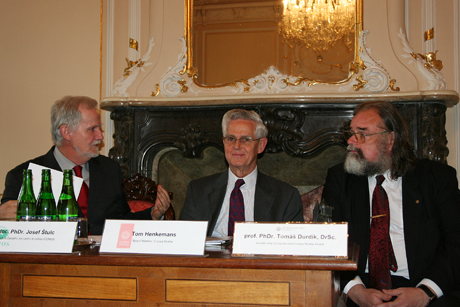
Foto: Marina Hužvárová, Academic bulletin
The European Union Prize for Cultural Heritage/Europa Nostra Awards celebrate excellence in cultural heritage conservation, ranging from the restoration of buildings and their adaptation to new uses, to urban and rural landscape rehabilitation, archaeological site interpretations, and care for art collections. Moreover, it highlights research, dedicated service to heritage conservation by individuals or organisations and education projects related to cultural heritage. The awards are supported by the European Commission in the framework of the Culture Programme. Europa Nostra is in charge of organising the selection and the award ceremony.
This Awards Scheme aims to promote high standards and high-quality skills in conservation practice, and to stimulate the trans-frontier exchanges in the area of heritage. By spreading the 'Power of Example', the Prize also aims to encourage further efforts and projects related to heritage throughout Europe.
The Local Award Ceremony took place at Villa Lanna – the representative residence of the Academy of Sciences of the Czech Republic – on October 19, 2011.
For 25 years, Tomáš Durdik has made an extraordinary contribution to the research, conservation and protection of the castles and fortifications that form part of the national heritage in the Czech Republic and former Czechoslovakia. He has developed an outstanding holistic approach to this work, looking at the history, architectural form and typology of these historic monuments, as well as their political and social significance, and their artistic qualities and symbolic meaning. He has used his vast knowledge not only to inform other specialists in the field, but also to develop the enthusiasm of generations of students and to raise general public awareness of the importance of preserving the authenticity of castles and fortifications.
Professor Tomáš Durdík has carried out intensive and comprehensive research of Czech castles, highly esteemed in pan-European circles. Rejecting the previously one-sided approach to castle research, Durdík created a complex interdisciplinary methodology, enabling a considerably closer insight into the reality of the Middle Ages period, and putting his findings in their European context. He has been involved with 1,000 on-site works, including 25 big archaeological research projects, such as the castles of Týřov, Křivoklát, Jindřichův Hradec, Vimperk, Pořešín, Kamýk nad Vltavou, Zlenice, and Orlík u Humpolce. He has published his findings and the large quantities of historical sources in over 400 articles and books. Professor Durdík works in the Archaeological Institute of the Czech Academy of Sciences in Prague, teaches at four Czech universities and is a member of many national and European expert committees and other bodies. He is also very intensively engaged in the care of monuments and historical heritage.
red
News
30 Aug 2016 Can Parasitology Ride the Rising Star of Disease Ecology?With a shared focus on host–pathogen relationships, parasitology and disease ecology seem to have a lot in common. But parasitology lacks the eye-catching—and wallet-opening—emphasis on known diseases. By working more closely with disease ecologists, could parasitologists gain more support for work crucial to predicting and controlling infectious diseases? The authors of an article published in the current issue of The Journal of Parasitology believe they can. The researchers studied the increasing popularity of disease ecology, looking at publications, research funding, jobs, and undergraduate courses. The findings of the study suggested that disease ecology could help improve teaching, encourage collaboration, increase funding, and recruit more students to parasitology.
more 5 Aug 2016 About The Courage to Say: A Spade Is A Spade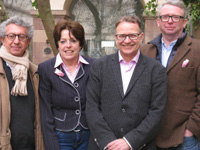 As a satellite event of ESOF 2016, EUSJA’s 45 th anniversary was celebrated in Manchester. The editor-in-chief of Academy Bulletin and Vice president of European Union of Science Journalists' Associations Marina Hužvárová presented a critical assessment of science journalism. “With her very frank and straight forward paper she touched many colleagues” commented Wolfgang C. Goede, member of EUSJA.
As a satellite event of ESOF 2016, EUSJA’s 45 th anniversary was celebrated in Manchester. The editor-in-chief of Academy Bulletin and Vice president of European Union of Science Journalists' Associations Marina Hužvárová presented a critical assessment of science journalism. “With her very frank and straight forward paper she touched many colleagues” commented Wolfgang C. Goede, member of EUSJA.
 An independent pilot study, released today at the Euroscience Open Forum (ESOF) currently taking place in Manchester, demonstrates that bottom-up research funded by the European Research Council (ERC) has already had major impacts. Over 70% of projects evaluated in the report have made scientific breakthroughs or major advances. The study concludes that the ERC invests in truly high-risk/high-gain research and that it also contributes significantly to the economy and society at large. The ERC grants have a very positive effect on researchers’ careers, the report states.
An independent pilot study, released today at the Euroscience Open Forum (ESOF) currently taking place in Manchester, demonstrates that bottom-up research funded by the European Research Council (ERC) has already had major impacts. Over 70% of projects evaluated in the report have made scientific breakthroughs or major advances. The study concludes that the ERC invests in truly high-risk/high-gain research and that it also contributes significantly to the economy and society at large. The ERC grants have a very positive effect on researchers’ careers, the report states.
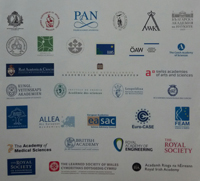 The Czech Academy of Sciences signed a pan-European statement on the value of research cooperation and collaboration internationally: "On the occasion of the ESOF conference in Manchester 2016, Europe’s Academies celebrate the value of science and research. Many of today’s most pressing challenges are global ones. International science and research collaborations greatly enhance the knowledge and tools we need to tackle them. This means institutions from across Europe need to be free to recruit excellent researchers. Our researchers must be able to work, cooperate across borders and travel flexibly as part of multinational activities. We must support the exchange of ideas. Unnecessary barriers to this mobility will weaken science and be to the cost of all nations. The academies of Europe stand together to support our governments in encouraging our countries and institutions to work in partnership to deliver research, scholarship and innovation across the continent for the benefit of society."
The Czech Academy of Sciences signed a pan-European statement on the value of research cooperation and collaboration internationally: "On the occasion of the ESOF conference in Manchester 2016, Europe’s Academies celebrate the value of science and research. Many of today’s most pressing challenges are global ones. International science and research collaborations greatly enhance the knowledge and tools we need to tackle them. This means institutions from across Europe need to be free to recruit excellent researchers. Our researchers must be able to work, cooperate across borders and travel flexibly as part of multinational activities. We must support the exchange of ideas. Unnecessary barriers to this mobility will weaken science and be to the cost of all nations. The academies of Europe stand together to support our governments in encouraging our countries and institutions to work in partnership to deliver research, scholarship and innovation across the continent for the benefit of society."
The attention of the global scientific community turns to Manchester in 2016 as the city prepares to host one of the world’s most prestigious scientific events – the EuroScience Open Forum (ESOF). The five day programme is made up of a number of different tracks. In the Science Programme there will be hundreds of seminars, workshops and debates on the latest science and technology from a broad spectrum of leaders and influencers from the scientific community, including Nobel laureates, influential policy makers, business leaders and prominent scientists.
more 14 Apr 2016 Overcoming Global Threats: Enhancing Intercultural Dialogue, Stability and Peace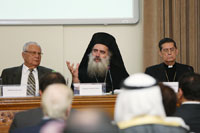 A conference on tackling global threats and a dialogue between cultures was held under the auspices of Foreign Minister Lubomir Zaoralek in the building of the Czech Academy of Sciences and in the Czernin Palace on April 13-14. It was organized by the Centre of Global Studies and the Oriental Institute from the Czech Academy of Sciences, the ambassadors of the Prague Group, and the experts from the Ministry of Foreign Affairs. The conference is one of the Strategy activities which are developed in the research program “Global Conflicts and Local Interactions”.
A conference on tackling global threats and a dialogue between cultures was held under the auspices of Foreign Minister Lubomir Zaoralek in the building of the Czech Academy of Sciences and in the Czernin Palace on April 13-14. It was organized by the Centre of Global Studies and the Oriental Institute from the Czech Academy of Sciences, the ambassadors of the Prague Group, and the experts from the Ministry of Foreign Affairs. The conference is one of the Strategy activities which are developed in the research program “Global Conflicts and Local Interactions”.
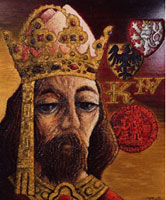 The 700th birth anniversary of King of Bohemia (1346 to 1378) and Holy Roman Emperor (1355–1378) Charles IV has been designated as one of UNESCO’s important world anniversaries for 2016–2017. Throughout 2016, the Sept centennial anniversary will feature a wide array of commemorative events ranging from exhibitions to historical-themed festivities, conferences and celebrations. The Czech Academy Sciences will recreate the period of Charles IV at several exhibitions. The Senate of the Czech Parliament and the Academy will jointly assemble an exhibition, The Legacy of Charles IV in the Course of Centuries, highlighting the impact of Charles’ reign on current Bohemian and European societies. The Academy will explore his impact on the arts, culture, learning and architecture. The Academy will host an international conference on the King of Bohemia’s foreign policy, a colloquium on belles-lettres and literary languages of his era, a summer school centered on “Literature, Learning and Art of Charles IV’s Era” and numerous lectures. Students will be able to acquaint themselves with Charles IV reign through a game. The Academy’s participation will be part of the research programs Strategy AV21.
The 700th birth anniversary of King of Bohemia (1346 to 1378) and Holy Roman Emperor (1355–1378) Charles IV has been designated as one of UNESCO’s important world anniversaries for 2016–2017. Throughout 2016, the Sept centennial anniversary will feature a wide array of commemorative events ranging from exhibitions to historical-themed festivities, conferences and celebrations. The Czech Academy Sciences will recreate the period of Charles IV at several exhibitions. The Senate of the Czech Parliament and the Academy will jointly assemble an exhibition, The Legacy of Charles IV in the Course of Centuries, highlighting the impact of Charles’ reign on current Bohemian and European societies. The Academy will explore his impact on the arts, culture, learning and architecture. The Academy will host an international conference on the King of Bohemia’s foreign policy, a colloquium on belles-lettres and literary languages of his era, a summer school centered on “Literature, Learning and Art of Charles IV’s Era” and numerous lectures. Students will be able to acquaint themselves with Charles IV reign through a game. The Academy’s participation will be part of the research programs Strategy AV21.
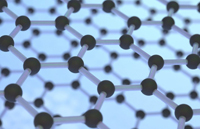 The European Science Foundation (ESF) and Graphene Flagship in collaboration with EuroScience have opened a call for early career researchers who are involved in graphene and related materials research activities to help cover the costs of registration, travel and accommodation to attend ESOF2016. The selected applicants will have the opportunity to participate in the tour visit organised to the National Graphene Institute (NGI) in Manchester and to attend the reception for young researchers at ESOF2016. More information on http://www.euroscience.org/news/grants-for-young-researchers-working-on-graphene-related-research-activities-to-attend-esof2016/.
The European Science Foundation (ESF) and Graphene Flagship in collaboration with EuroScience have opened a call for early career researchers who are involved in graphene and related materials research activities to help cover the costs of registration, travel and accommodation to attend ESOF2016. The selected applicants will have the opportunity to participate in the tour visit organised to the National Graphene Institute (NGI) in Manchester and to attend the reception for young researchers at ESOF2016. More information on http://www.euroscience.org/news/grants-for-young-researchers-working-on-graphene-related-research-activities-to-attend-esof2016/.
The Research Center of the Oriental Institute (Czech Academy of Sciences) at Academia Sinica in Taiwan (RCT) has been established on December 3, 2015. The Research Center in Taiwan will act as a branch office of the Oriental Institute of the CAS and is intended to serve as a platform to facilitate and strengthen academic exchange between Czech and Taiwanese scholars as well as institutions. The Center is part of a long-term interdisciplinary research project Power and Strategies of Social and Political Order. Czech research fellows will participate in conferences and hold colloquiums with Taiwanese colleagues. In cooperation with the Academia Sinica the institute plan to organize annual joint workshops whose proceedings will be published. Concomitantly it will continue building the network of partner institutions and thus create a solid foundation for further scholarly exchange. In cooperation with Charles University in Prague I will also support doctoral students wishing to conduct research at the Center.
more 21 Jan 2016 Algatech Centre The Algatech Centre, which is a scientific division of the Institute of Microbiology of the CAS located in the baroque building of the Opatovicky mlyn (mill) near Třeboň in South Bohemia, focuses on the research of photosynthetic microorganisms, including algae, cyanobacteria and photosynthetic bacteria.
The Algatech Centre, which is a scientific division of the Institute of Microbiology of the CAS located in the baroque building of the Opatovicky mlyn (mill) near Třeboň in South Bohemia, focuses on the research of photosynthetic microorganisms, including algae, cyanobacteria and photosynthetic bacteria.
There are at least 70 thousand different and varied species of algae in nature and their potential is huge in many respects. The Laboratory of algal biotechnology therefore studies processes and technology involved in the efficient production of algae and the use of algal biomass. It seeks new bio-active compounds in algae to be used as dietary supplements, in pharmacology and biomedicine and cultivates algae enriched with rare chemical elements which are scarce in both human food and animal fodder. Scientists also carry out research into various metabolites of cyanobacteria and their effects on human cells from the pharmacological and toxicological point of view. Special interest is paid to substances inhibiting the division of cancer cells and/or selectively inducing their apoptosis.
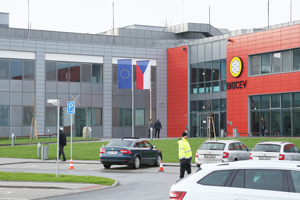 In the presence of Deputy Minister of Education, Youth and Sports, Stanislav Štech, Rector of Charles University Tomáš Zima, Vice-President of the Academy of Sciences of the Czech Republic, Vladimír Mareček, and other important guests, the implementation phase of the BIOCEV project – the Biotechnology and Biomedicine Center of the Academy of Sciences of the Czech Republic and Charles University in Vestec ended December 18, 2015. Full operation is planned beginning January 2016. BIOCEV is currently made up of the implementation of five research programmes and the operation of six sets of research infrastructure and service laboratories. By 2020, as many as 450 researchers, including 200 post-graduate students, are supposed to work at the BIOCEV Center. The Center’s objective is to learn details about organisms at the molecular level that will be used in applied research and in the development of new therapeutic procedures.
In the presence of Deputy Minister of Education, Youth and Sports, Stanislav Štech, Rector of Charles University Tomáš Zima, Vice-President of the Academy of Sciences of the Czech Republic, Vladimír Mareček, and other important guests, the implementation phase of the BIOCEV project – the Biotechnology and Biomedicine Center of the Academy of Sciences of the Czech Republic and Charles University in Vestec ended December 18, 2015. Full operation is planned beginning January 2016. BIOCEV is currently made up of the implementation of five research programmes and the operation of six sets of research infrastructure and service laboratories. By 2020, as many as 450 researchers, including 200 post-graduate students, are supposed to work at the BIOCEV Center. The Center’s objective is to learn details about organisms at the molecular level that will be used in applied research and in the development of new therapeutic procedures.
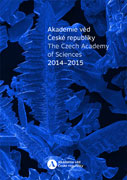 The Czech Academy of Sciences has issued a report accounting selected research results achieved by its scientific institutes in all research areas in 2014 and in early 2015. It outlines its research activities, as well as goals of the new research centres and facilities of the CAS and its new Strategy AV21, the main aim of which is to perform top level multilateral interdisciplinary research reflecting the needs of contemporary society. The book (printed version in PDF) documents the CAS´s efforts to transfer research findings into practical outputs and its co-operation with partners in the industrial sphere, it presents the CAS´s co-operation with various institutions on international, regional and local levels and mentions some of the major social events and anniversaries marked by the CAS in 2014 and 2015.
The Czech Academy of Sciences has issued a report accounting selected research results achieved by its scientific institutes in all research areas in 2014 and in early 2015. It outlines its research activities, as well as goals of the new research centres and facilities of the CAS and its new Strategy AV21, the main aim of which is to perform top level multilateral interdisciplinary research reflecting the needs of contemporary society. The book (printed version in PDF) documents the CAS´s efforts to transfer research findings into practical outputs and its co-operation with partners in the industrial sphere, it presents the CAS´s co-operation with various institutions on international, regional and local levels and mentions some of the major social events and anniversaries marked by the CAS in 2014 and 2015.
![]() On the 14th and 15th October 2015 Global Change Research Centre will host an international conference called "Gender Mainstreaming in STEM and Global Change Sciences' (STEM – science, technology, engineering and mathematics). The conference, which is one of the events within a project of FP7 – EGERA, will feature international experts in the field of equal opportunities in science and research. More information here.
On the 14th and 15th October 2015 Global Change Research Centre will host an international conference called "Gender Mainstreaming in STEM and Global Change Sciences' (STEM – science, technology, engineering and mathematics). The conference, which is one of the events within a project of FP7 – EGERA, will feature international experts in the field of equal opportunities in science and research. More information here.
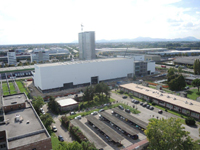 ITER will be the biggest-ever fusion device generating a plasma whose volume will be close to 840 m3 at 150 million ˚ C, ten times the temperatures at the core of the sun. To achieve these temperatures we would need powerful heating systems using high-energy beams, in order to push together the nuclei and trigger off a fusion reaction.
ITER will be the biggest-ever fusion device generating a plasma whose volume will be close to 840 m3 at 150 million ˚ C, ten times the temperatures at the core of the sun. To achieve these temperatures we would need powerful heating systems using high-energy beams, in order to push together the nuclei and trigger off a fusion reaction.
F4E, the European Union organisation managing Europe’s contribution to ITER, and Siemens, the global powerhouse operating in more than 200 countries, have started to collaborate on the development of three units of equipment that will host power supplies, whose requirements go beyond present industrial practices, as part of the ITER Neutral Beam Injectors (NBI), one of the ITER heating systems. One unit will be manufactured for a research facility operating in Italy, whose aim is to help scientists test the NBI components before they go into production mode for ITER. The other two units will be manufactured as part of the ITER powerful NBI system, designed to deliver 33 MW of power in order to inject neutral particles to the core its super-hot plasma. The works are expected to last seven years and their overall value will be in the range of 18 million EUR. Pietro Barabaschi, F4E acting Director, explained that “through this collaboration, a European global innovator will contribute to the largest international collaboration that is expected to influence the future energy mix”. Michael Krohn, Project Manager for High Voltage Decks and High Voltage Bushings at Siemens, stated that “our company is proud to be part of this international research project and to play an active role in the construction of units for the ITER Neutral Beam Injectors. We look forward to a fruitful collaboration”.
Three years after the announcement of the discovery of a new particle, the so-called Higgs boson, the ATLAS and CMS Collaborations present for the first time combined measurements of many of its properties, at the third annual Large Hadron Collider Physics Conference (LHCP 2015). By combining their analyses of the data collected in 2011 and 2012, ATLAS and CMS draw the sharpest picture yet of this novel boson. The new results provide in particular the best precision on its production and decay and on how it interacts with other particles. All of the measured properties are in agreement with the predictions of the Standard Model and will become the reference for new analyses in the coming months, enabling the search for new physics phenomena. This follows the best measurement of the mass of the Higgs boson, published in May 2015 after a combined analysis by the two collaborations.
more 27 Aug 2015 For the first time ever: Protons accelerated in the plasma produced from hydrogen ice by a laser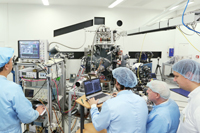 High-energy protons find application in medicine for irradiation of tumors as well as in many other science and technology fields (such as proton radiography). Very efficient acceleration of protons occurs in the hot plasma produced by a high-power laser beam focused on a target containing hydrogen. The thicker the target and the more hydrogen in it, the more accelerated protons. The ideal would be to have a laser target of pure hydrogen frozen into a solid state at temperatures as low as -261°C.
High-energy protons find application in medicine for irradiation of tumors as well as in many other science and technology fields (such as proton radiography). Very efficient acceleration of protons occurs in the hot plasma produced by a high-power laser beam focused on a target containing hydrogen. The thicker the target and the more hydrogen in it, the more accelerated protons. The ideal would be to have a laser target of pure hydrogen frozen into a solid state at temperatures as low as -261°C.
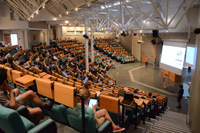 From July 18 to 23, the Prague City welcomed the 2015 Annual Computational Neuroscience Meeting. One of the organizers was the Institute of Physiology CAS.
From July 18 to 23, the Prague City welcomed the 2015 Annual Computational Neuroscience Meeting. One of the organizers was the Institute of Physiology CAS.
The purpose of the Organization for Computational Neurosciences is to create a scientific and educational forum for students, scientists, other professionals and the general public to learn about, to share, to contribute to, and to advance the state of knowledge in computational neuroscience.
The organizers of the The 2015 Science TV and New Media Festival are pleased to announce the Call for TV programmes or New Media productions for the 2015 European Science TV and New Media Festival and Awards. There is a significant expansion of the agenda this year and a change of format, with the festival and awards now combined as a single three day event in Lisbon, Portugal, from 23 to 25 November 2015. The venue will be the celebrated Sao Jorge theatre in the centre of Lisbon. There will be ten awards decided in Lisbon, and two further awards relating to young people and education decided by specific audiences Europe-wide, all listed below. The screenings will be complemented by panel led discussions and keynote talks on themes relating to Science and the TV/AV media. This year there will also be discussions after each screening of the productions shortlisted by the international jury. The Awards will be presented in Lisbon in a special evening on the third day of the event at the Jorge Theatre in central Lisbon, on 25 November.The deadline for entries is the end of June 2015. All entries must include a filled-in entry form and (apart from interactive video) a DVD. More information on http://europaws.org/.
more 17 Jun 2015 ERC celebrates 5,000th top researcher fundedEight years after its launch, the European Research Council (ERC) is celebrating a significant milestone: the funding of its 5,000th researcher. To mark this occasion, a debate in the European Parliament and a symbolic awarding of the grant took place June 16, 2015 in Brussels. The 5000th grantee, Dr Iva Tolić, is a leading Croatian cell biophysicist. An ERC Consolidator Grant will allow her to study the forces acting on the chromosomes during cell division. Her research could be critical for the development of new therapies against cancer. Dr Tolić will carry out her project at the Ruđer Bošković Institute in Zagreb. After receiving the news, she commented: "This ERC grant will make a big difference to me professionally. It will allow me to establish my new lab in Croatia, hire six team members and buy a state-of-the-art microscope. For the next five years, I will be able to focus purely on my research. I am very happy to be the 5000th ERC grantee."
more 16 Jun 2015 SYRIA – From Crony Capitalism to War Economy Oriental Institute of the Czech Academy of Sciences cordially invites you to a lecture on SYRIA – From Crony Capitalism to War Economy: The Economic Roots of the Current Crisis by Akram Kachee (Sciences Po, Lyon) on 23 June, 2015, 13:00–14:30 in Oriental Institute in Prague. Akram Kachee is an associate researcher in political science, GREMMO, France. His specialization is the Middle East and especially Syria, economy of war, and political opposition movements in Syria.
Oriental Institute of the Czech Academy of Sciences cordially invites you to a lecture on SYRIA – From Crony Capitalism to War Economy: The Economic Roots of the Current Crisis by Akram Kachee (Sciences Po, Lyon) on 23 June, 2015, 13:00–14:30 in Oriental Institute in Prague. Akram Kachee is an associate researcher in political science, GREMMO, France. His specialization is the Middle East and especially Syria, economy of war, and political opposition movements in Syria.
“The economic issues are crucial to our understanding of both the causes of the civil war in Syria and the functioning of the society since the conflict has begun. In order to get a better sense of the events in Syria, this presentation will show how the pre–2011 economic system forms a part of the genesis of the conflict while identifying actors and dynamics of the war economy.”

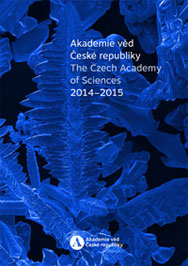
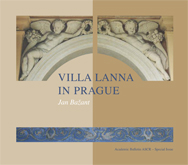
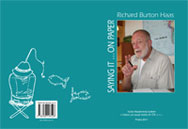
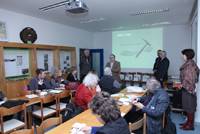
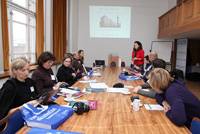
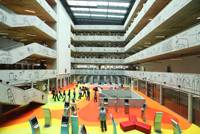
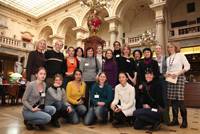
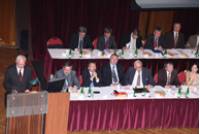
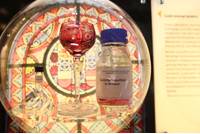
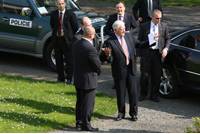
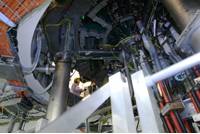
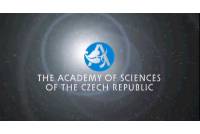
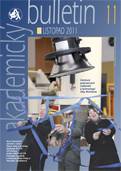

 Česky
Česky
